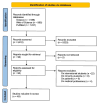Decolonizing medical education: a systematic review of educational language barriers in countries using foreign languages for instruction
- PMID: 40361088
- PMCID: PMC12077016
- DOI: 10.1186/s12909-025-07251-2
Decolonizing medical education: a systematic review of educational language barriers in countries using foreign languages for instruction
Abstract
Background: Language barriers in medical education, particularly in countries where foreign languages are used as the medium of instruction, pose significant challenges for domestic medical students. These barriers hinder academic performance, comprehension, and communication with patients, ultimately impacting the quality of healthcare delivery. Despite the prevalence of this issue, a comprehensive understanding of its effects remains underexplored. This systematic review aims to synthesize evidence on language barriers in medical education and propose strategies to address them.
Methods: Following PRISMA guidelines, we conducted a systematic review of studies published up to March 21, 2024, using PubMed, Scopus, and Web of Science. Eligible studies focused on language barriers faced by medical, pharmacy, nursing, dental, or veterinary students in countries relying on foreign-language-based medical education. Data extraction included study characteristics, reported language barriers, and their impact on education and patient communication. Quality assessment was performed using the Mixed Methods Appraisal Tool.
Results: From 5,410 citations, 49 studies involving over 14,500 students met the inclusion criteria. Most studies (n = 32) were conducted in Arab countries, with 15 in Saudi Arabia. Two key themes emerged: (1) Education and Academic Performance: Students frequently reported difficulties comprehending foreign-language textbooks, lectures, and assessments, leading to poor academic outcomes, increased stress, and higher dropout rates. (2) Communication Skills with Patients: Studying and training in a foreign language hindered students' ability to communicate effectively with patients in their native language, impacting empathy, medical history collection, and overall patient care. Many studies highlighted students felt more confident and effective when using their native language during clinical interactions.
Conclusion: Language barriers in foreign-language-based medical education significantly impede students' academic performance and patient communication skills. Addressing these challenges through reforms, such as integrating native language instruction and supplemental language training, is crucial to enhancing medical education quality and ensuring effective healthcare delivery. Future research should explore innovative solutions, including bilingual education and AI-driven translation tools, to bridge these gaps.
Keywords: English; Language barriers; Language of instruction; Medical education; Mother tongue; Native Language.
© 2025. The Author(s).
Conflict of interest statement
Declarations. Ethics approval and consent to participate: Not applicable. Consent for publication: Not applicable. Competing interests: The authors declare no competing interests.
Figures
References
-
- Torralba KMD, Katz JD. Quality of medical care begins with quality of medical education. Clin Rheumatol. 2020;39:617–8. - PubMed
-
- McGaghie WC, Barsuk JH, Wayne DB, Issenberg SB. Powerful medical education improves health care quality and return on investment. Med Teach. 2024;46:46–58. - PubMed
-
- Hamad AA, Amer BE. Should medicine be taught in leading medical languages or the mother tongue?? Curr Med Issues. 2024;22.
-
- Ameayou S, Ouali M, Hassoune S, Ben Abdelaziz A, Bousfiha AA. Student’s attitudes towards medical education in Arabic (Morocco 2020). Tunis Med. 2023;101:26–35. - PubMed
-
- Hamad AA. Decolonization of medical education: A global screening of instructional languages and mother tongue dependence. J Med Surg Public Heal. 2023;1:100007.
Publication types
MeSH terms
LinkOut - more resources
Full Text Sources
Miscellaneous



